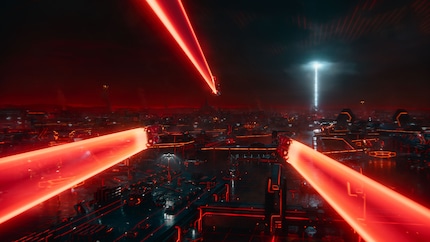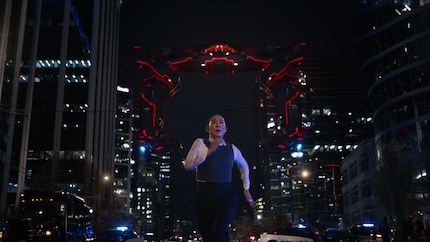
News + Trends
Zurich presents first AI actress - Hollywood reacts in horror
by Luca Fontana

Spectacle meets criticism of systems: Tron: Ares makes the neon lights shine again. The film is ambitious, loud and enthralling. It’s a shame this immaculate veneer has less vision behind it than was once promised by the franchise.
Don’t worry: there are no spoilers in the film review that follows. Everything mentioned here is already common knowledge or has been revealed in the trailers. Tron: Ares is in cinemas from 8 October.
Imagine a world made of light. Of cold glass, pulsating lines and infinite power. A universe in which information turns into matter, and programs live and breathe like people. Above you is a sky full of static, a glitching storm that never lets up. Below you, the ground is made of pure code, intersected by veins of neon light which pulse as electricity runs through them.
This is The Grid – the world of Tron. An illuminated, digital parallel universe, as precise as an algorithm yet as chaotic as a dream. Here, everything is symmetry and order, movement and noise, beauty and danger all at once.
Uniquely intoxicating.
Fifteen years after the completely underestimated Tron: Legacy – and 42 years after Tron, the original – we’re right back there.
Or maybe we’re not.
Because Tron: Ares is set in a present where the digital world has long been part of our reality. This time, the programs are leaving The Grid and entering our world after they become real – or at least almost. The digital creations can only survive for 29 minutes before they crumble. This leads to a race to discover the Permanence Code that would enable the digital beings to remain in our world.
The race is between two tech giants: ENCOM, the company founded some time ago by Kevin Flynn (Jeff Bridges), wants to use the technology to cure disease and make scientific breakthroughs. In the opposite corner is Dillinger Systems, a military enterprise which considers the AI in The Grid to be the perfect military weapon.
And somewhere in between is Ares, played by Jared Leto. This is a program that was developed for war but starts to question its purpose. What begins as a purely military mission provokes an existential crisis in the program: what does it mean to live when you’re made of code? And what does it mean to be human if you can be programmed?
These are fascinating questions. In its best moments, the film creates almost biblical scenes from these: roads at night, intersected by red lines of light which encircle the city like infernal veins. Explosions with blazes that mirror the flickering of The Grid. Tron: Ares has stunning visuals – a film that’s made to be watched in the cinema because its world looks bigger on a projector screen in a way that isn’t backed up by its content.
Much bigger.

The issue is Tron: Ares wants to achieve more than it ends up doing. It philosophises about consciousness, life and control, even about the risks and opportunities of artificial intelligence. But it never dares to enter uncharted territory. The big questions are there, it’s just that the film doesn’t pick up on them. Not really. It’s as if the film is frightened to become any grander in scope than it really wants to.
Maybe that’s down to Joachim Rønning. I was sceptical of the decision to choose the Norwegian director from the beginning. Rønning is a studio director, not a visionary with things to say. Someone who knows how to handle big budgets and internal processes at Disney. But that’s precisely the problem: Tron was never a franchise defined by a fixed playbook. It feeds off its vision. From the thrill of the new. From the risk of letting the digital world and philosophy collide. Even if there is a little too much exposition, if we think back to Tron: Legacy.
So far, Rønning hasn’t proved he’s capable of something like this, either with Pirates of the Caribbean: Dead Men Tell No Tales or Maleficent: Mistress of Evil. Both films looked expensive, but felt hollow. Like a perfectly polished shell without a soul. And now he’s the one who’s supposed to direct a story about artificial consciousness and digital creations looking for a soul?

Somehow that’s more poetic than the film itself. A director who’s often accused of producing superficial work is in charge of a film tackling questions about what it means to be real. About yearning for something that appears human even if it’s made of code.
In his defence, in interviews Rønning has always emphasised how he finds Tron: Legacy to be visually stunning but emotionally hollow. This is what he planned to do differently. He wanted to bring heart and soul into a world made of cold light.
A nice wish that unfortunately never comes true. Or only partly. Because Rønning is a surface-level guy. And Tron: Ares has to be more than this. Otherwise it would merely be a perfectly rendered nothing in a digital no-man’s land.
Perhaps that’s the reason why Tron: Ares leans so heavily on the Pinocchio theme. It’s intended to give this cold world a heart, as the director promised. The only problem is, this is nothing new. It’s an age-old motif that can be traced through literature and cinema – from Mary Shelley’s Frankenstein to the replicants in Blade Runner, from A.I. Artificial Intelligence and Ex Machina through to Ghost in the Shell. It’s always about the same thing: the question of where the code ends and consciousness begins.
Tron: Ares doesn’t bring anything new to this story. Maybe it doesn’t want to either. Perhaps it just wants to be relevant and cling one last time to a real world that’s becoming ever-more artificial. My honest opinion? There’s nothing wrong with that.

In actual fact, the film couldn’t be more relevant. While Tron: Ares tells the story of how a digital figure attempts to become real, the exact opposite is happening out in the real world: artificial beings are learning to imitate us so accurately that we ourselves can hardly tell what’s real any more. Our reality has already caught up with the film.
For example, the first AI actor – Tilly Norwood – has just been presented at the Zurich Film Festival. An avatar with a perfect skin tone, flawless facial expressions and a voice that sounds sweeter than any human’s.
Ironically, while the fictional story in Tron is still asking whether programs can have a soul, we have for some time now been living in an age where machines have started mirroring our souls. Against this backdrop, with a lot of goodwill Tron: Ares could be interpreted less as science fiction and more an assessment of our current situation. A story about the blurring of reality and simulation – and about how easy it is to forget where the border actually lies.
As I already said, the full effects of the visuals are felt in the cinema. Especially the scenes at night, when the city is illuminated by the blazing red of the Light Cycles and the roads are intersected by lines of light which run through the dark like burning veins. This gives the appearance of The Grid slowly expanding into our world. That’s a bit meta, to say the least.
In these moments, Tron: Ares is the perfect example of cinema’s raison d’être: because it creates worlds whose full impact can only be felt on a large projector screen. And, despite all my criticism, I’m thankful to Tron: Ares for this.

However, in terms of its dramatics, the film takes a while to kick in. The first act feels like a system booting up: cool, functional and with a lot of exposition to get the audience up to speed. But once it all gets going, the film finds its rhythm. Then it really picks up pace, sometimes even too much. It’s as though it’s frightened to pause and think its own thoughts right through to their conclusion.
That’s a shame because it’s the philosophical questions – what makes us human? What makes consciousness different from programming? Should we really be afraid of AI, or does it also offer opportunities? – that remain at surface level. What I’m saying is Tron: Ares repeatedly dances around big ideas without really grappling with them in its haste to get to the next jaw-dropping action set piece. It all feels a little inconsequential to me. If you’re bringing the content of the world of Tron into our own, you can’t shy away from the themes. And for good reason.
Anyway, the film has a new sound. Nine Inch Nails replace Daft Punk’s glossy perfection with industrial harshness – a sound that’s less appealing but more grounded. Harder. More powerful. It’s a perfect fit for the story Tron: Ares wants to tell. A world where everything has become artificial needs precisely this kind of authentic sound.
What remains is a film that neither wins me over nor disappoints me. Tron: Ares isn’t a milestone, but a passable sequel. One that understands the digital world stopped being a vision of the future a long time ago, and actually is a reflection of our present. It looks magnificent and sounds stunning but doesn’t go deeper than its surface-level imagery. I’ll be deducting some points for that.
Still, although I wasn’t exactly challenged over the two-hour runtime, I was entertained and never got bored. Maybe that’s all you can expect from a blockbuster these days. Tron: Ares is a film that chooses dependability over the risk of radical failure. Three stars, bright enough to light the way to part four – which will hopefully tell a braver story.
I write about technology as if it were cinema, and about films as if they were real life. Between bits and blockbusters, I’m after stories that move people, not just generate clicks. And yes – sometimes I listen to film scores louder than I probably should.
Which films, shows, books, games or board games are genuinely great? Recommendations from our personal experience.
Show all